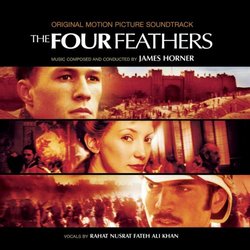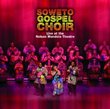Four Stars For Horner's "Four Feathers"
G M. Stathis | cedar city, utah USA | 09/20/2002
(4 out of 5 stars)
"Shekhar Kapur's version of the Victorian, adventure epic "The Four Feathers" is the latest in a line of film interpretaions of A.E.W. Mason's novel (1921, 1928, 1939, and a 1978 television production). What sets it apart from most of the others is the fine orchestral score by James Horner. Only one other film entry, Alexander and Zoltan Korda's (1939), produced a musical backdrop equal to the story of personal courage set against the British efforts to defeat the Mahdist uprising in nineteenth century Sudan. In that case, the legendary Miklos Rozsa penned what, to date, was considered to be the definitive score for this tale. In many ways, however, Horner's work is more interesting and more compelling in its use of indigenous music, and its thematic focus on young Harry Faversham whose individual convictions earn him four white feathers, symbolic of cowardice, from those closest to him. It is certainly more ehtnic in its use of percussion and vocals, and just does avoid doing this without commission of the sin of Near Eastern musical cliches. And Horner is more lyrical in his themes than Rozsa. Utilizing a series of themes and motifs, a characteristically poignant theme for Faversham, a good love theme, necessary Victorian, military motifs, pounding percussion, along with fascinating, and sometimes very moving, vocals by Rahat Nusrat Fateh Ali Khan, Horner has created a diverse and complex score that is one of the main strengths of this film. The opening cut, "The Makings of a Fine Soldier," combines a haunting vocal with a martial call and use of a dramatic percussion background to ably set the stage for the story that is about to unfold. Throughout this score there is a point and counterpoint made by the Near Eastern and martial motifs and the Faversham theme. Horner is quite successful in pitting the Faversham theme, depicting supreme personal courage, against martial bluster and the the nearly overwhelming environment of a hostile and exotic, desert setting. The various parts of this score come together in a manner quite fitting for this epic and personal story, and Horner's music stands in the equally fitting company of Rozsa's; no small achievement that. The soundtrack recording is well produced and adequately packaged by Sony."
An entertwined bit of beauty
Hamid Khan | Denver, CO USA | 09/26/2002
(5 out of 5 stars)
"One element found repeatedly in James Horner's music is his ability to both inspire and resonate the message of a movie. From Titanic to Braveheart, and, more recently, A Beautiful Mind and now, The Four Feathers. What is remarkable about Four Feathers is Horner's artful collision between two worlds: the Muslim-Mahdist Sudan with Imperial Britannia. One cannot help be struck by the music's passion, its repeated calls of honor, clarions of war, and the travails of a haunted soul making that journey."
Four feathers for "The Four Feathers"
Brandon Cutro | Tyler, Texas United States | 01/13/2003
(4 out of 5 stars)
"When you have a war movie and the composer for the film is James Horner, you know that the music will be good. And it is. The Four Feathers is Horner's latest war film to score, with previous ones being Braveheart, Enemy At the Gates, and Windtalkers to name a few. This score basically contains 3 parts to it. The first is a military like feel that represents the war aspect of the film. The second is a grand and sweeping love theme and the third is a heroic and adventurous theme that actually is the same theme as the love theme, just played differently. The ethnic instrumentation used is ethnic percussion, ethnic woodwinds, and a sarangi (what is that?). A different and nice touch to this score is the vocals of Rahat Nusrat Fateh Ali Khan. (Say that 10 times fast!) His vocals remind me of Hans Zimmer's score to Black Hawk Down, as vocals similar to this were used in that score. "The Makings of a Fine Soldier" open the score with the heroic theme played on strings, trumpets, and snare drums. "The Dance" contains the love theme played on piano with woodwinds playing along side. "Harry's Resignation" builds and builds with trumpets and snare drums and "Sniper!" is an all out ethnic percussion and solo vocal cue that is a wild one. The album's middle tracks mainly consist of ethnic instrumentation and solo vocals until "Escape" brings back the action music and the solo vocal chants. The best track of them all is the last one "A Coward No Longer". Here Horner unleashes the heroic main theme in full force with plenty of strings and brass. The length of this album is 79 minutes which is more than enough and is the basic length that most Horner scores are at. I recommend this one to anyone who likes James Horner and the score to Black Hawk Down."


 Track Listings (13) - Disc #1
Track Listings (13) - Disc #1
